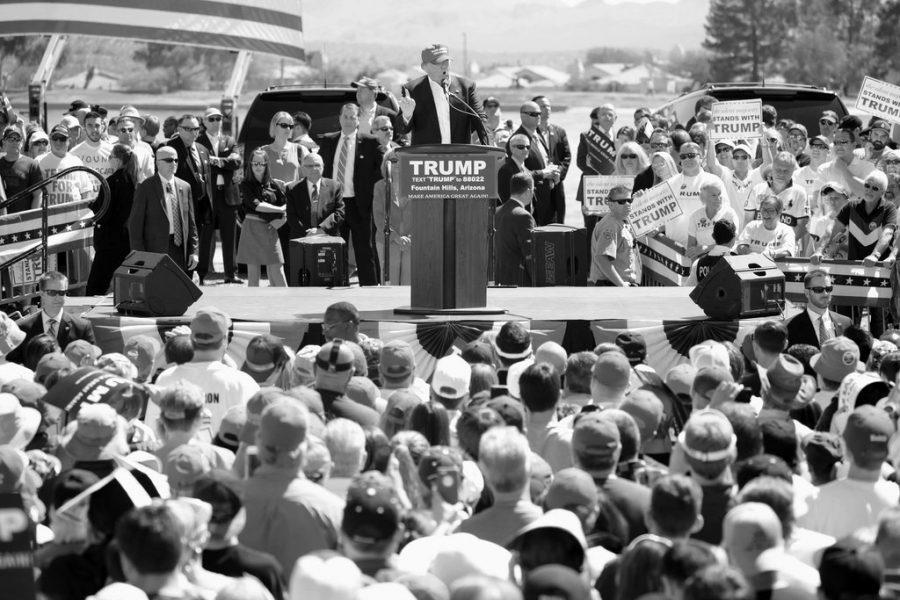No.1 Lesson Learned From This Election: Words Matter
Holiday Issue
December 19, 2016
In Proud family folklore, my great-grandmother Rose serves as the Mark Twain of pithy saying attribution. One particular Rose-ism gained enormous dinnertime traction in the weeks leading up to the 2016 election, “Don’t judge the vote of a hungry person if your belly is full.”
Most frequently invoked in discussions of privilege or intersectionality, this year’s reference stemmed from a deep desire to bridge the seemingly unbridgeable chasm among our family’s voters. One side raged about Washington insiders – waste, corruption, inefficiency; the other, equally righteous, expressed horror at the kraken of hate, misogyny, and xenophobia released in the name of reclaiming greatness.
Amid the turmoil, I remembered the first time my great-grandmother let me sit with her as she filled out her ballot. She described how, as a schoolgirl in Italy, she’d been chosen to present flowers and shake hands with Benito Mussolini during his tour of her island town. “But he was the bad guy,” I scolded, to which she replied, “We were hungry and scared, and he promised us food and safety.”
As debates raged over the past few months, I tried to keep that in mind by seeking good reasons that friends and family could support a candidate I felt was so unequivocally bad.
Not bad because of governing policies or business experience – in my opinion as a first-time voter, Donald Trump was bad because his archaic notions of women, as well as racial and ethnic minorities, run directly counter to what I believe to be the promise of our Constitution. His biting insults, vulgar attitude, and violent rhetoric, at least for me, obliterated the luxury of voting on policy.
But people voted, and Trump won. It remains to be seen how much of his appeal was because of his hate-filled diatribes and how much despite them.
President-elect Trump began with a tone of reconciliation, assuring millions that it was time “to bind the wounds of division.” My family watched 60 Minutes together and prayed collectively for healing. And then he picked Steve Bannon.
As publisher of Breitbart, Bannon is an unapologetic propagandist of White Supremacy, anti-Semitism, and hate. Within hours, supporters were whipping up distractions like military service and his Ivy League degree. In reply, Alexandra Petri of the Washington Post asked, who are we to judge him by “his words and actions, the voices that he has given a platform to, and the ugly philosophy he has allowed to spread?” Petri’s satirical query placed me in the core of my discontent, both during the election and since:
Words matter.
Language serves as the currency of human interaction. Nice to meet you. I love you. I’m sorry.
We the People. I have a dream. Grab ’em by the pu$#y.
The promise of our democracy lies in the free exchange of ideas and our fundamental right to express them, but the promise of our humanity lies in our respect for their impact.
A candidate, Cabinet pick, or voter who spews hate-filled rhetoric has every right to do so. But, I would argue, we may just as freely reject the assertion that those words don’t matter.
In the days following, both Senator Chris Coons and Governor-elect John Carney issued firm renunciations of Trump’s selection of Steve Bannon to his White House Staff. By doing so, our Delaware leaders have stood up on our behalf and held Trump and Bannon to their words. From Senator Coons:
“Mr. Bannon personally has made despicable comments about women, the mentally ill, the LGBT community, and people of faith. At Breitbart, Mr. Bannon created an outlet built upon stoking racism, sexism, homophobia, and anti-Semitism. These are not the values that have made America great. . . . The President-elect must make it clear that the toxic blend of hate and bigotry that Mr. Bannon has made a living propagating has no place in a Trump administration.”
Their tone struck the balance I’ve sought over the past few months. Yes, let us respect each other’s views on taxation, healthcare, abortion, government spending, term limits, and national security. Our democracy thrives in times of vigorous debate and engaged citizenry. But we must work as hard to preserve our nation as we do our government. A nation of people brought together by choice and circumstance — people who every few years rally behind notions of hope, greatness, or being stronger together. Those ideals are not guaranteed by our government; in fact, they may only be achieved by citizens committed to thoughtful listening and careful words. For this issue of Whittier, we asked our writers and editors to think about what it means to a community when we think less about what we have the right to say and more about what we choose to. We invite you to join us in our exploration.































